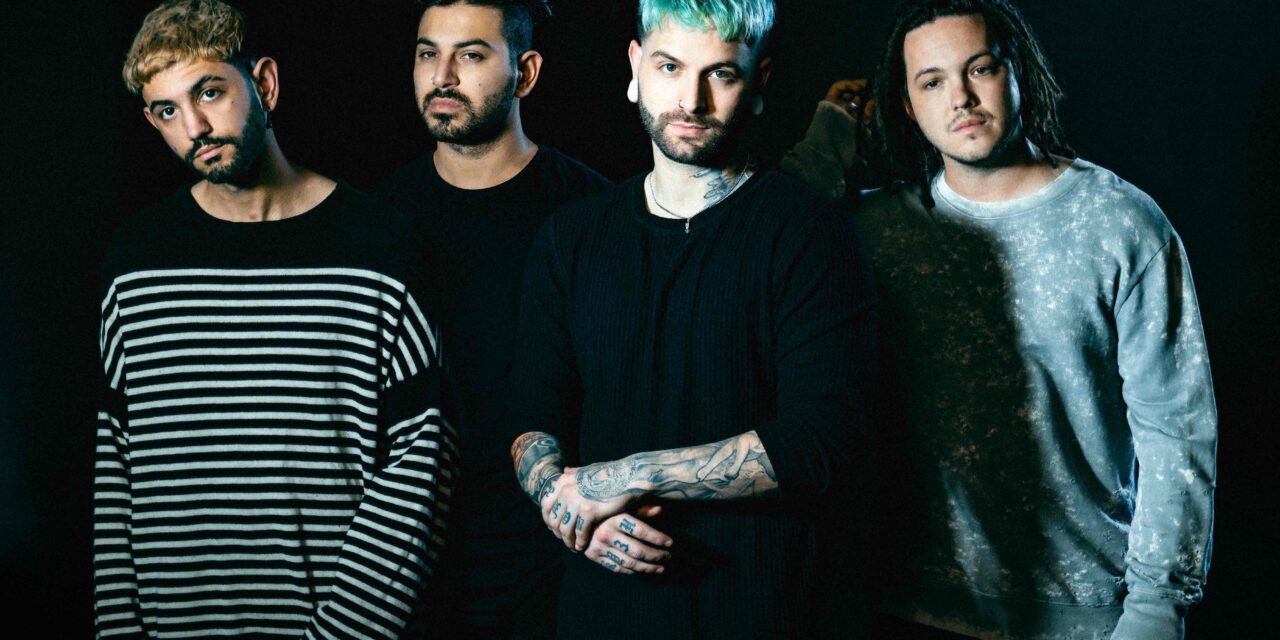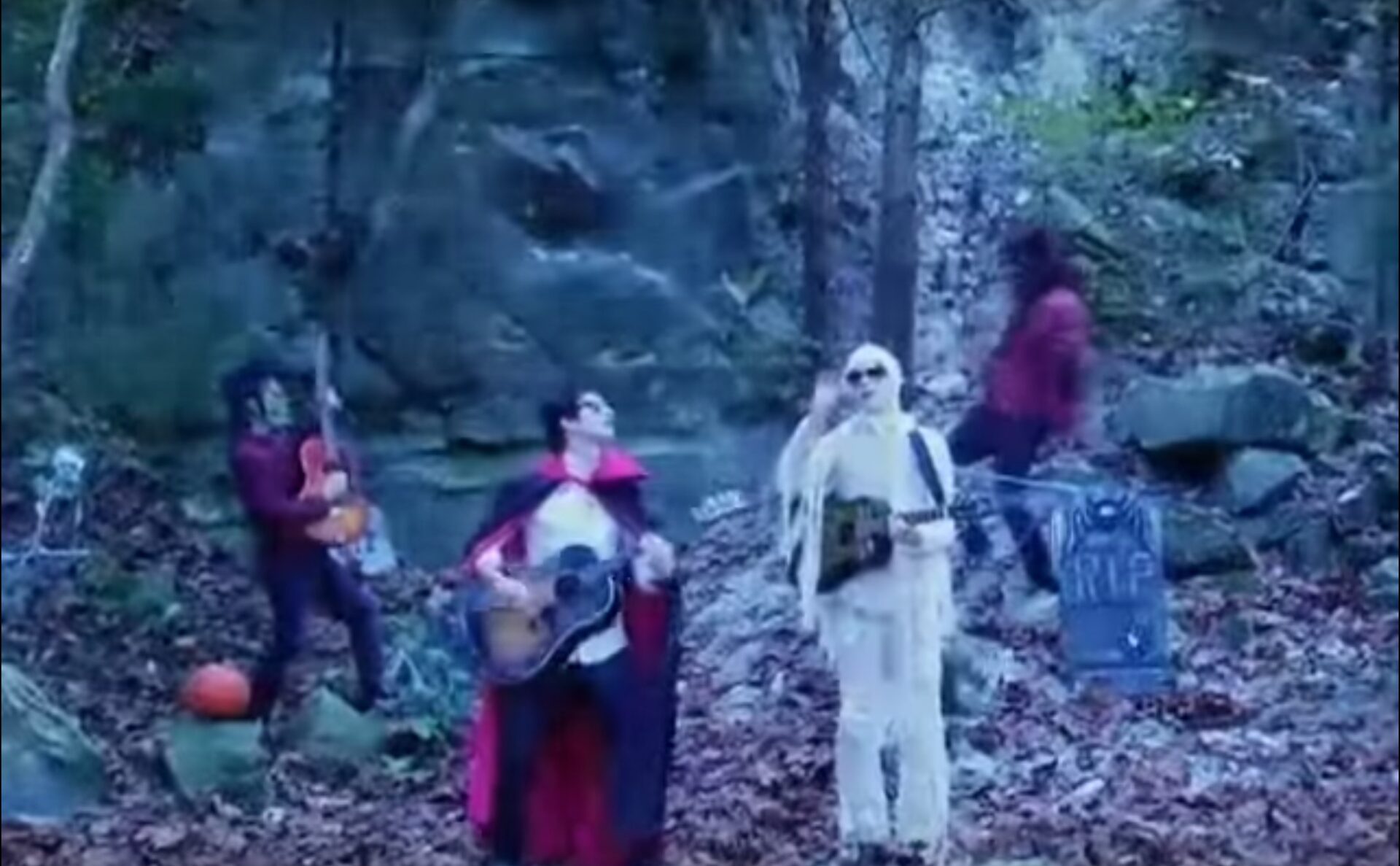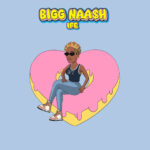The frontman talks about working through anxiety and a tumultuous year to produce the aggressive sophomore effort.
Sitting in a swivel chair in his new home, Bryan James Kuznitz, lead vocalist for Florida rock outfit Fame on Fire— Kuznitz, guitarist Blake Saul, drummer Alex Roman, and bassist Paul Spirou— is the picture of calm, a departure from the aggressiveness that can be heard in his vocals on the hard-hitting recent single “Cut Throat”, a song that Kuznitz has always wanted to write, and numerous covers, when he chats with Substream via Zoom to talk about his band’s new record Welcome To The Chaos, set to be released on July 22nd. Unflinchingly honest, Kuznitz pushes back his blue hair and explains how “being in a depressive and manic place” formed the genesis of the sophomore effort. “I’d point back to being in a headspace where I was surrounded by darkness and seeing no way out of it. That’s why the title track— which features Ice Nine Kills frontman Spencer Charnas—is about ‘welcome to the madness inside my head.’”
Formed in 2013 in West Palm Beach, FL, Fame on Fire started out as a cover band, putting their own spin on songs from artists such as Taylor Swift, Lil’ Uzi Vert, Lil’ Nas X, The Weeknd, and more. Gaining recognition for their cover of Adele’s hit single “Hello,” the band released their debut EP Transitions, which contained five original songs. In 2020, the band released their debut studio album, Levels, which contains the standout single “Her Eyes”, which sees Kuznitz delve into the toxicity of an emotionally abusive relationship and the mental health-oriented “Headspace’ featuring PoorStacy that discusses breaking out of the inner prison of the mind. Welcome, To The Chaos has Kuznitz tackling themes of mental health in-depth, examining anxiety with a more personal lens while leaving room for hope and understanding along the way.
Acting as a follow-up to the 2020 album Levels, Welcome To The Chaos takes listeners on a ride through the emotional rollercoaster that Kuznitz was riding as he created this album, strapping everyone in for the highs and lows of the ride over the course of 13 tracks. Sonically different from one another — the “Outro” is haunting and “Cut Throat” is palatably angry —each song on the album shows Kuznitz wanting to take a different approach to genre and continue to push the boundaries of rock, hip-hop, and heavy music while showing the wide range of influences on his band’s sound. “ We definitely wanted to be more artistic.” Touching on topics such as mental health, heartbreak, and addiction, singles such as “Plastic Heart” and “Lost in Doubt” underscore Kuznitz’s ability to use storytelling as a method of elevating the relatability of his band’s music. “That’s when you really come into being an artist. When you let go of the rules and you just write what you feel.”
Kuznitz also believes that it’s the unknown tracks that make people fans of a band. “It’s not the singles don’t make fans, it’s the deep cuts in the album. That’s how you get true fans, the songs that the general public doesn’t know about. Not every song will be a single. When you write a single, you know you’re writing a single. You write the melody and you’re like ‘Okay, this song is going to be a fuckin’ single’ You can pretty much tell. When we were writing “Plastic Heart” we knew right away that this was a single. When we were writing ‘Welcome to The Chaos’ we were like ‘We want this to be a single’ Because “Welcome to the Chaos” is still one of those songs that’s weird and artsy but also really catchy. There are some songs that are singles and others where we’re like ‘Let’s get artsy with this and show the people what we’re about, the deeper side to us.’ “
Kuznitz chats with Substream Magazine about what led to the creation of Welcome To The Chaos, being more than a cover band, how social media has helped his band’s ascension in the scene, and more.
What inspired the title for your album, Welcome To The Chaos?
This album is just stories of chaos— it opened the door for me to write “Cut Throat.” It just had to do with my mental state and just me coming into my own as a writer and singer. The chaos is in my mind. I wanna tell people ‘Yeah, it gets better, but it just changes. It doesn’t get better, it just evolves.
This album is more aggressive than your previous effort Levels. What made you want to go in that direction?
“ There’s a couple of things: One, we didn’t want the new album to sound like the old album. We don’t want to make the same record twice. That seems counterproductive. Secondly, I went through a crazy period in my life where everything around me felt like it was just being destroyed or deteriorating before my eyes. A lot of it was due to anxiety. I had a panic attack and it put me in a very depressive state for 3 months, it was a little while.
After that depressive state, I got out of it and I went manic, which is really fun. So, when I was manic, the way I got myself out of this hole was like ‘I’m not being true to myself and what I wanna do with music. That’s gotta change.’ We already had 200 demos ready for this album and I showed up to the studio and I was like ‘Guys, I hate this demo. Let’s redo everything.’ and everyone was like ‘What the fuck’, rightfully so because we already did 200 demos. I was like’ Trust me. Let’s just keep working on music and see what comes out.’ So we started working on music and sure enough, I guess this crazy mental warfare I was in, when I got out of it, led to the point of starting to make Welcome To The Chaos. After that point, everything started to click and make sense. The songs were better. They’re definitely much more aggressive and darker because that’s where I was in my life at the time.
“Lost in Doubt” seems to revolve around self-doubt. What was the inspiration for the single?
“ It’s not even about doubting ourselves because I don’t think we ever doubted ourselves. It’s about everyone else. Everybody else is basically saying ‘ You’re just a lost soul’ There were so many people, from my choir teacher to my siblings to cousins who were like ‘No, this isn’t possible’, Now my parents are very supportive, but at some points, they were like ‘ You need to have a back-up plan because the music thing is hard.’ I kind of got forced to go back to school to get a degree, which I never got. I started doing recording and stuff and that became a backup plan. I still do that to this day. Everyone basically told us ‘What you guys are trying isn’t possible.’ And here we are. We’re still climbing, but I’m pretty confident about this album.”
“Ketamine” seems to revolve around addiction. What was the inspiration for that track?
“ Ketamine was one of the songs where everyone’s like ‘Are we sure we want to release this next?’ Blake, our guitar player, was really concerned about the lyrical content on it and was like ‘I’m not sure if everyone’s gonna understand this.’ ‘Ketamine’ is a really catchy song but it’s literally me saying ‘Ketamine’ over and over again. (laughs) The lyrical content of ‘Ketamine’ means a lot to me, it’s very specific to me. But I’m sure there are other people out there who are like ‘I can relate to that’ because it’s like ‘this dude’s in a really dark place and he thinks ketamine is the only solution to pull him out of it I’ve definitely been there before in my life. I feel like there are people who’ve been there too, like ‘Oh, I need this drug to get out of this’ The reality of the situation is I’ve never taken ketamine. I’ve never done it. It’s one of those things where it’s like ‘Is this my outlook?’ It’s not going to be called ‘Xanex’
Your band started out as a cover band. How have remixing songs helped your writing process?
“100 percent. We wrote music before doing covers and stuff like that. But the music wasn’t really that good. We could write a song and put a song together just fine, but it wasn’t a good song. So doing covers helped us understand what melodies sound good, what melodies work for me, what riffs we can put over these chord progressions to make them sound cool, and what people really like. It really helped us understand writing music. If it wasn’t for doing covers, we wouldn’t be able to write the songs we write today. We wouldn’t be able to say ‘ We want a song that’s angry and aggressive but still has some melody to it’ We wouldn’t be able to do that sort of thing without doing covers in the past.”
Your band has successfully utilized Youtube and Tik-Tok to expand your fanbase and drive attention to your original music. Is social media presence something that more up-and-coming bands should invest time in?
“If a band isn’t doing Tik-Tok, they’re wasting their time. Nobody’s going to see your content. You can’t record a song or shoot a video and upload it to Youtube and expect it to get thousands of views, it just doesn’t happen. Now what you need to do is you need to film 50 different Tik-Toks for the same song over and over again. No matter how cringy you think it is, no matter how much you hate it (trust me, I hate it sometimes too; it’s very cringy for me sometimes) you just gotta do it. If you’re not doing it, you’re just releasing your music to nobody. Nobody’s going to hear you or know of you. It’s the new way it’s done. You need to film and be on Tik-Tok. “
Your screaming vocals stand out in your band’s music. How did you learn to do it?
“ I learned how to scream before I learned how to sing rock music. I kept trying to do the Lamb of God performance in [the video game] ‘Rock Band’ and I remember that one day I got it and I was like ‘Wait, this is how you scream?’ I’m gonna tell you right now, I scream completely wrong, not the proper method. I learned how to scream like that when I was 16 or something and I would try to scream and I’d be like ‘This is sick’ Another time, I tried to do really aggressive vocals like Chester Bennington by smoking a lot of cigarettes. I was like’ This guy smokes cigarettes. I’m going to smoke cigarettes.’ So I would smoke a couple of cigarettes and then I would push my voice to this cracking point, to just breaking and that’s where I got my sound and my tone.”
“Over the years, I’ve learned how to properly control it. When I first started doing it, it was all over the place. If you want something really bad, you gotta work your ass off to get it and I’ve worked my ass off to get my voice where it’s at.”
What do you want fans to take away from this album regarding their own chaos?
“ Honestly, I just want them to dive into it, throw some headphones on and go on a long drive and listen to it front to back. It’s almost just like listening to a storybook. Rock out to it, have fun with it, and don’t take it too seriously. It’s a serious album but enjoy it and go through the journey.
The reason we end the album with ‘Dead or Alive’ is because I wanted there to be a sense of ‘it doesn’t matter how bad things are, it’s gonna be okay. We’re gonna make it through.’ That’s the ultimate takeaway I want them to feel if they are going through anything. Everyone’s going through shit. We live in a very fucked up country right now, so everyone’s feeling it one way or another. At the end of the day, we’re all going to figure it out.”
You’re going on tour with One Ok Rock in the fall in support of Welcome To The Chaos. What are you most looking forward to on it?
“ I’m really looking forward to that. I’m trying to become best friends with Taka. I want us to be boys. They’re so fucking sick. When we got that tour, I was like ‘Let’s go’. I do this thing where I watch the live performances of any bands that we’re gonna be on tour with and their live performances are absolutely out of this world. They’re insane, so I’m stoked. It’s going to be a really good tour with some amazing crowds.”













